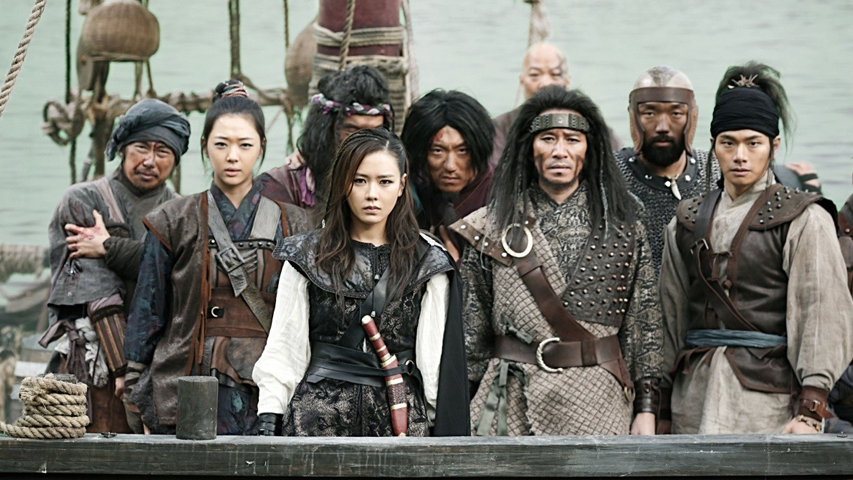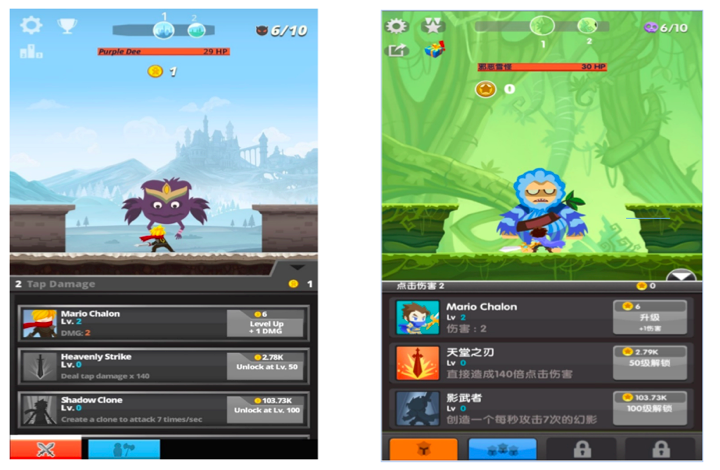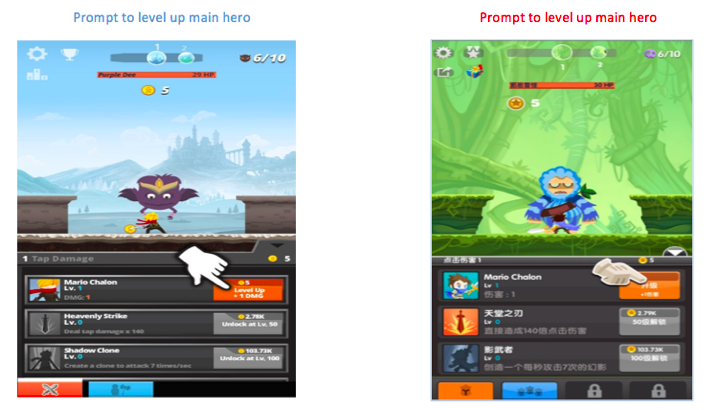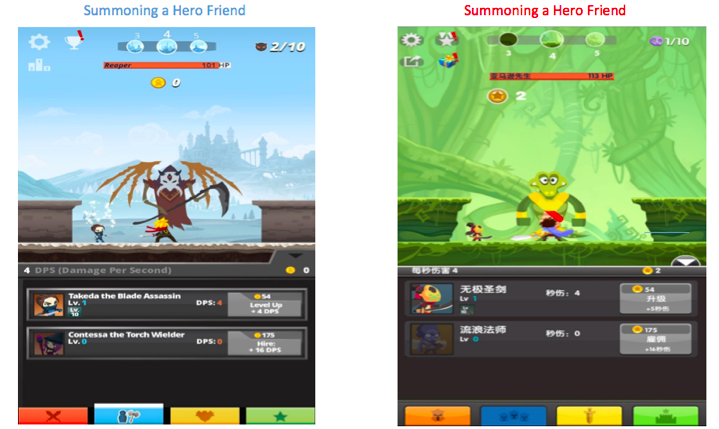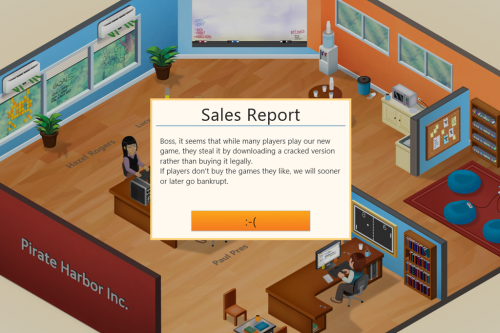Case: how to protect yourself from Chinese pirates?
The game of the Boston studio Oniix was copied by Chinese clone makers. The team shared their experience of dealing with them. We offer you a translation.
At the beginning of the year, Oniix, a Boston-based publisher with offices in Asia, was enjoying the last days of the New Year holidays and was preparing to work hard in the coming 2015. The company has just signed a partnership agreement to launch the Tap Titans game in China, a project developed by the Toronto-based Game Hive studio. It was expected that Tap Titans would be released on Chinese New Year, and that the game would become a big hit.
However, just 10 days after the launch, unexpected news came from the company’s Shanghai office.
Tap Titans copied and pasted. The Chinese copy was called Tap-Tap Heroes, and the fake had exactly the same UI and gameplay as the original. In addition, she managed to get into the top 15 of the most downloaded games in the country, and in grossing – in the top 500. Over the next two weeks, the fake had two more copies.
In other words, Oniix and Game Hive were now forced to compete for a place in the top – with pirates. The cherry on the cake were reviews in the App Store, where users accused the original game of imitation.
The situation is nightmarish, although familiar to many mobile developers. Fortunately, Oniix had trained specialists at its disposal in the USA and in China – just for such cases.
So, what means did the publishing house resort to?
Clone or copycat?
How did Oniix understand that the Chinese completely skewed the game, and not just repeated some aspects? In order to answer this question, you need to delve into the details.
In games with RPG elements, the player’s level is usually displayed at the top left. Gold/cash/stats measurements are also distributed at the top of the screen, and notifications/quests/store icons are at the bottom. UI, as a rule, follow the same pattern from project to project. And in games of related genres, the same features come across, and in order to lower the entry threshold, they are usually designed in a familiar way to the user. Therefore, a certain coincidence in the appearance of the game interface is inevitable.
The UI of Tap Titans and Tap-Tap Heroes, however, coincided throughout the game. They were similar to each other not only in where the health measures, the game menu, the action buttons, and the arrows that set the direction were located, but even in where the character and his opponent were located on the screen. The picture below shows that Tap-Tap Heroes copied even the shadows on the icons.
Here and further on the left – Tap Titans, on the right – Tap-Tap Heroes
The games were like twins in everything. From how new skills are opened…
…before the player summons an auxiliary character.
When one or two elements are similar, it is most likely a coincidence. But Tap-Tap Heroes was too much like Tap Titans-on too many points.
To confirm their guess, Oniix and Game Hive downloaded Tap-Tap Heroes and played it. It turned out that not only the interface of the game turned out to be identical, but also how the hero evolved, how points and damage were counted to him, as well as each of the other elements of the game. When you got to level 50 of the pirated version, the boss had exactly the same vulnerabilities as in Tap Titans. When the hero reached level 142, the damage he inflicted on enemies coincided with the indicators of the original up to the digit after the decimal point. The Chinese didn’t just copy a couple of gameplay moments – they shamelessly stripped everything down to the last line of code, and then just added a slightly redesigned graphics.
According to Oniix, this is not an isolated case: “Developers are speechless when we show them that a clone of their game has collected tens of millions of downloads,” comments Everett Wallace, head of the publishing department at Oniix. The problem has gained such momentum that Oniix receives requests for help from everywhere – sometimes even from major studios. All of them are asking for help in the fight against Chinese pirates – to tell them what steps to take to protect themselves from them.
Oniix itself has used a multifaceted approach to solve the problem, which well illustrates the complexity of the Chinese market.
Anti-Pirate strategy
Western developers only deal with Apple, Google and Amazon. On the Chinese market, on the contrary, there are literally hundreds of Android stores. And this is in the hands of local clone makers, especially when they decide to copy the application of a Western developer. So Oniix’s fight against pirates turned out to be a difficult undertaking.
First of all, the publisher went through the Chinese App Store and a lot of Android stores. This was done in order to understand which platforms the copied game was ported to. Then an official request was sent to Apple and to each of the Android stores.
After that, Oniix sent an email to the “developers” of Tap-Tap Heroes. In it, the publisher warned of possible legal consequences that would follow if the game was not removed from the stores. The pirates replied that Tap-Tap Heroes is a completely original game, and refused to admit guilt.
Then Oniix started collecting information about the Chinese studio. In the process, we managed to find out that there is a company to which pirates may have investment obligations. The publisher contacted this company and told about the stolen game. However, there was no answer here either.
Oniix did not give up and continued to look for leverage. Finally, the search was crowned with success: it was found out that the pirates may have been somehow connected with the venture fund of North America (North American VC fund). The publisher again sent a request to remove the game from the stores. Only this time Oniix acted through investors. In addition, the company stressed that in case of refusal it would raise a fuss in the Western press.
This method worked. The investment firm has done everything to clear its name. The pirates had to give in and remove the game from all Chinese stores.
Unfortunately, Tap-Tap Heroes was not the only Chinese clone of Tap Titans. But Oniix worked hard with Apple and local stores, and in the end all copies were seized. In some cases, it even turned out to transfer users from a clone to Tap Titans (players received an update, but when they downloaded it, they downloaded the original game, not the clone).
Since then, the Chinese audience of Tar Titans continues to grow, and the game itself continues to bring revenue.
What should I do to prevent the game from being copied?
Oniix was lucky – she managed to find a company outside of China that had leverage over pirates. But many victims of clone makers cannot boast of such luck. Therefore, here are tips on how to protect yourself from pirates from the very beginning.
1. Think about security in advance. By the time you discover that the game has been copied, the brand and revenue may already be affected. And, as we can see from the Oniix case, it will take a lot of effort to remove copies from the stores later. It is better to think about security measures in advance so that the game code is not copied (read more about how to avoid this here).
2. Apply non-standard methods in the fight against pirates, approach the matter creatively. For example, Game Dev Story launched a “hacked” version of their own game. It had a couple of interesting modifications that led to the fact that the characters after a couple of hours of the game lost all the game currency. The irony, by the way, was that the original game is a simulator of a mobile studio. And the message that the players received said that they went bankrupt because of the pirates.
Message to pirates from developers Game Dev Story
3. Launch to the whole world from the very beginning. Many developers are hesitant to immediately launch a worldwide release. The reason, as a rule, is that they do not have enough resources, or they are not sure that the audience will accept the project well. If possible, try to plan a global launch. If not, just don’t delay the release in other countries. Mario Alvarez, head of the bizdev department at Oniix, comments: “When you postpone the release in China, you give local clone makers time to take all the cream off your potential audience, build a user base around the project and ruin the reputation of their own game.” In other words, when preparing for the release, make sure that the Chinese market is your priority.
For example: due to the fact that King postponed the release of Candy Crush in Asian markets, the pirates managed to successfully copy the game, and more than once. And even though the company teamed up with the local giant Tencent, it was not possible to completely solve the problem. If even such a large publisher as King could not cope with the pirates, why would you take the risk?
4. Monitor the market. Try to establish contacts with leading local stores – and do not be lazy to periodically check the tops of downloads and grossing to see if a clone of your game got into them or not.
Pirates attacked – work with stores and do not retreat
Even if you did everything right, there is still a great chance that the cunning Chinese clone makers will get to your game. If this happens, be persistent, contact Chinese stores and try to fight pirates through official channels.
It is also convenient to work directly with Chinese stores because in certain cases you can try to pick up the audience of a pirate project with the help of an official update, as Oniix did. As already mentioned, in order for this to become possible, it is necessary to maintain good relations with Chinese stores and monitor the local market.
And finally, insist on your own, give evidence, do not back down – and you will win. “We found out that pirates, in response to a direct accusation, can begin to defend themselves – and even resort to the services of lawyers. They will deny everything and will claim that your games are just from the same category. But the facts and evidence eventually defeat all the unfounded arguments of the pirates,” concludes Everett Wallace of Oniix.
A source: http://www.gamasutra.com
You will be able to learn about the latest trends in the gaming industry first-hand, personally meet and discuss working issues with leading companies in the game development and publishing market at White Nights Moscow 2015, which will be held on October 13-14.
